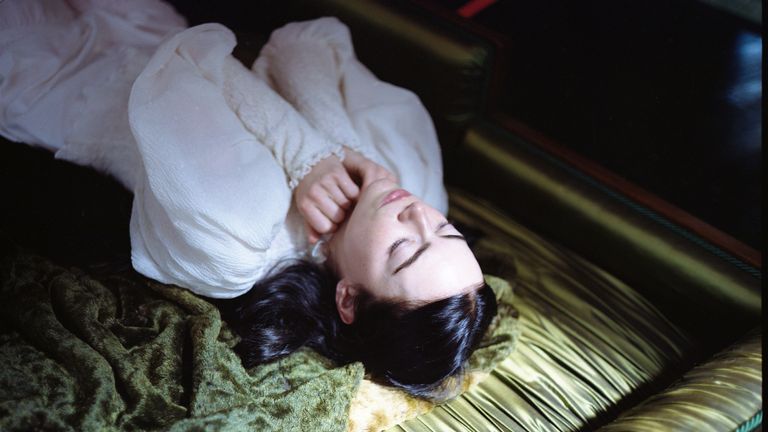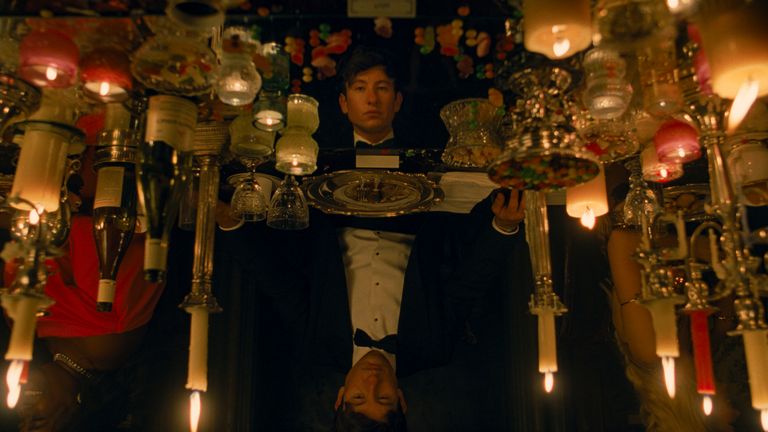If you’ve read anything about Emma Stone’s latest film Poor Things, you’ll know the big takeaway: there’s lots and lots of sex.
Stone plays Bella Baxter, a woman who was pregnant before she died, only for a scientist to bring her back to life and replace her brain with that of the still-living baby. (Yes, you read that correctly). Bella has the mind of an infant, but the needs of a young woman discovering what life is all about.
The story of a Frankenstein-inspired sex-obsessive might sound too bizarre to work, but the film has been universally praised by critics and is already winning awards – Stone was named best actress at the Golden Globes at the weekend. And it’s not the only movie currently making headlines for its NSFW sex scenes (or not suitable for watching with your parents, as many found out the hard way over Christmas).
Filmmaker Emerald Fennell‘s class satire Saltburn features full-frontal nudity, graphic sex, and a bathwater scene that will leave you speechless, while also out this month is Andrew Scott and Paul Mescal’s All Of Us Strangers, a film that is both tender and explicit.
But is all this a turn-off for younger audiences? Age classification – the desire for a film to be seen by as many eyes possible – and changing cinematic tastes have made sex on screen something of a rarity nowadays.
Poor Things has certainly left wide-eyed critics questioning their own prurient curiosity over the sheer amount of times Stone’s character goes at it.
“I’m a producer on the film, so we definitely talked a lot about all of it,” the Oscar-winning star told Sky News. “It was very clear to me from the beginning that it was necessary because [Bella’s] not ashamed of what’s going on with her. So why would WE be?”
Sex is just one element of Bella’s experience, Stone says. “She’s soaking in everything for the first time: food, politics, philosophy, dancing, travel and, yes, sex. She’s just exploring everything and seeing what works for her… to me, it just furthers what she’s learning.”
Read more:
Why sex on screen is getting better
Nudity warnings and anti-bullying training on TV sets
From today’s cultural perspective, movies such as Basic Instinct or Fatal Attraction – filmed by men and centred on the desires of men – haven’t exactly aged well. And you only need to look at the ever-declining levels of nudity throughout each season of Game Of Thrones to see how attitudes towards sex, particularly women and sex, have changed even since that first series in 2011.
Stone’s co-star Mark Ruffalo, who plays Baxter’s love (or sex) interest, says sex on screen is less gratuitous than it used to be – but argues the sex scenes in Poor Things are necessary.
“That’s a big part of our lives,” he says. “You don’t see it a lot anymore. It feels a little Victorian, in a way.”
And in the last 12 months, sex on screen has made a bit of a comeback. Notably, Christopher Nolan wrote his first-ever sex scene into Oppenheimer, feeling the story necessitated it.
Saltburn, meanwhile, has divided critics, with some saying the graphic sex scenes do not make up for holes in the plot.
The bathwater scene in particular has prompted heated arguments online from those, mostly younger viewers, who argue sex on screen is inherently problematic – triggering to those who don’t want to watch it, exploitative to those made to act it out.
A recent UCLA (University of California, Los Angeles) Gen Z study found nearly half of the respondents felt sex wasn’t needed for the plot in most TV shows and films, while more than half wanted to see more platonic storylines.
Speaking to Sky News last year, Fennell disagreed with those findings: “I think that that has been blown out of proportion… I think that was quite a small study and, well, I’m not sure that it’s true.”
While the #MeToo movement prompted a more cautious approach from Hollywood to how sex was depicted, one school of thought is that what we’re seeing now are post-pandemic films born out of a desire to rip off those face masks.
“It certainly feels like a post-COVID world,” said Fennell. “That the things of the body were not allowed to be touched. The more I think about it, the more I understand that’s where it comes from.”
Rather than gratuitous nudity for the sake of it, as a filmmaker Fennell believes it’s about using sex to widen the lens of what she can say with her stories.
“Rarely you see anything like below the shoulder blades [in Saltburn], so the sex scenes in this film are all actually our own imagination.”
If sex on screen leaves you hot under the collar, it’s time to compose yourself – because film in 2024 is getting full-on.
Poor Things is showing in cinemas, All Of Us Strangers from 26 January. Saltburn is streaming on Amazon Prime Video




